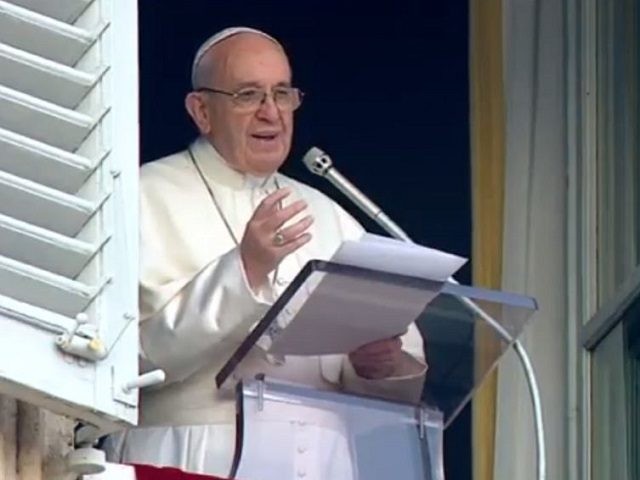Pope Francis underscored the countercultural message of Christianity on Tuesday, a message which often leads to persecution and even martyrdom, as it did in the case of the first Christian martyr, Saint Stephen.
The Christian Church has celebrated the feast of Saint Stephen on the day after Christmas (or December 27 in Eastern Christianity) for centuries, which in the United Kingdom is known as Boxing Day. The deacon St. Stephen is considered the first martyr—or protomartyr—of Christianity, and Acts of the Apostles describes his death by stoning.
In his address before about 20,000 pilgrims in Saint Peter’s Square Tuesday, Pope Francis said that the message of Jesus “is uncomfortable and disturbs us, because it challenges the worldly religious power and provokes consciences.” He calls us to conversion and a “change of heart,” the pope added.
Even though there might not seem to be a clear connection between the feast of Saint Stephen and Christmas, the pope said, the two, in fact, are closely related.
While on Christmas we heard the proclamation that “the word became flesh and dwelt amongst us,” Francis said, St. Stephen threw the leaders of his people into crisis because “he firmly believed and professed the new presence of God among men.”
Stephen “knew that the true Temple of God is now Jesus, the eternal Word come to dwell among us, like us in all things except sin,” he said.
In the Acts of the Apostles, Stephen is accused of preaching Jesus, who “will destroy this place and subvert the customs that Moses has handed down to us,” he said.
Stephen, the pope noted, was anchored to Jesus’ message until his death, and his last prayers were, “Lord Jesus, receive my Spirit” and “Lord, do not hold this sin against them,” in reference to those who were stoning him.
This, Francis said, is a “faithful echo” of the words pronounced by Jesus on the Cross: “Father, into thy hands I deliver my spirit” and “Father, forgive them for they know not what they do.”
“These words of Stephen were only possible because the son of God came to Earth and died and rose for us,” Francis said. “Before these events they would have been humanly unthinkable expressions.”
“Stephen begs Jesus to receive his spirit,” the pope continued. “In fact, the risen Christ is the Lord, and he is the only mediator between God and men, not only in the hour of our death, but also in every moment of life, for without him we cannot do anything,” he said.
Therefore, “we too, before the child Jesus in the manger, can pray to him: ‘Lord Jesus, we entrust our spirit to you, receive it,’ so that our existence may be a truly good life according to the gospel,” he said.
Pope Francis has often called attention to the plight of persecuted Christians throughout the world, insisting on several occasions that there are more Christian martyrs in modern times than in the first centuries of the Christian era.
Everyone is called to a “spiritual journey of intense prayer, concrete participation, and tangible help in the defense and protection of our brothers and sisters who are persecuted, exiled, killed, and beheaded just for being Christians,” Francis said in a 2015 address in the Vatican.
“They are our martyrs of today, and there are so many, we can say that they are more numerous than in the first centuries,” he said.
Recent studies confirm that Christians are the most persecuted religious group in the world.
During the year 2016, about 90,000 Christians were killed for their faith across the globe, making them the most persecuted group in the world, according to a study from the Turin-based Center for Studies on New Religions (CESNUR).
The director of CESNUR, Dr. Massimo Introvigne told Breitbart News at the time that the tens of thousands of Christians killed for their faith are just the tip of the iceberg, and most persecution of Christians never makes the news.
Along with the enormous number of deaths, a great many more Christians—as many as 600 million—were prevented from practicing their faith in 2016, he said.
Moreover, whereas atheistic communist regimes were the greatest persecutors of Christians in the last century, “Islamic ultra-fundamentalism” has taken its place as the number one agent of persecution, Introvigne said.
The Center’s findings match reports by other scholars and human rights groups, such as the 2016 “World Watch List,” published by the Open Doors organization.
Follow Thomas D. Williams on Twitter Follow @tdwilliamsrome

COMMENTS
Please let us know if you're having issues with commenting.